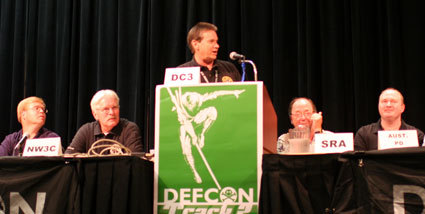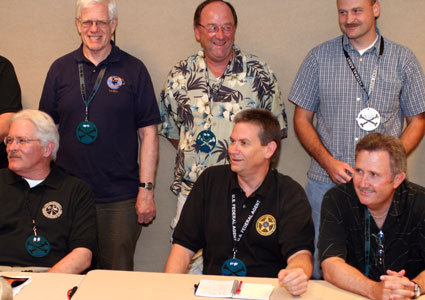Defcon 2006: Hackers can work for the Feds - no degree required
Las Vegas (NV) - The great need for qualified computer security personnel is now forcing the government to rethink rigid hiring guidelines. At the Defcon computer security convention in Las Vegas, more than a dozen federal agents told attendees that traditional requirements like college degrees and polygraph tests were no longer strictly required for government employment. They also said security clearances are being approved quickly.
In a rather surprising change of strategy, the government is streamlining its process of attracting hacking talent. Jerry Dixon, deputy director for the United States Computer Emergency Readiness Team, told journalists that his organization has hired several people without degrees. Jim Christy, director of the Defense Cyber Crime Institute told attendees that most of the people who come to work for him usually come in as contractors and have no background with the government. "We're gonna teach you how to do the job... without college degrees," Christy said.
Apparently, "very gifted" have the chance of being hired even without a high-school degree. "I just spent five and a half hours last night talking with someone who has never graduated high school. And he is one of the most innovative people I know," said Dr. Linton Wells II, assistant secretary of defense for the Department of Defense.
The Fed panel at Defcon 2006
Wells expalined that the government desperately needs qualified people as 40% of the senior personnel will be retiring during the next few years. With this upcoming shortage, the government is willing to accept people gaining skills away from schools. "The last standing perception of government service is that you need a college degree," said Wells. He said this perception does not match reality. According to Wells, many employees, contractors and even people in the senior executive service do not have degrees.
Christy told us that becoming a contractor first is the "easiest and quickest" way to eventually getting a government job and said 60% of his organization is composed of contractors. Government hiring procedures often can be "slow and antiquated" and working with contractors sometimes is the only option to complete a critical job, he explained.
"If we need immediate help, we will hire someone as a contractor and then try to create a government position to move him into," said Christy. He added it can take "two to three years" for that position to be created.
Get Tom's Hardware's best news and in-depth reviews, straight to your inbox.
Another misconception, according to the Defcon speakers, is that security clearances take months or even years to complete. Christy told us that new hires are getting cleared surprisingly quickly. In many cases, hires can receive an interim secret clearance in about 3 to 4 weeks. According to Christy, the interim check consists of a "quick little" background inquiry and a check for warrants and convictions. "Even some people in government are surprised at how quickly people are being cleared," Christy said.
Federal agents pose for the press
Even though the government is willing to drop the four-year degree requirement, other federal agents on the panel warned of requirements that cannot be eliminated. Mike Jacobs, vice president and director of SRA and a former deputy associate director of the NSA, warned about security clearances.
"You gotta sit and take the polygraphy, folks," said Jacobs. However this strict polygraph requirement only exists at some agencies - like the NSA. Both Dr. Wells and Christy told us that polygraphs are usually not required for other government agencies.
Many people and probably most Defcon attendees believe polygraphs are required for most government jobs, but Wells said, "This is absolutely not true... polygraphs are not required for most secret level jobs." Christy told us, "Everyone doesn't have to be polygraphed. In certain programs, up to 90% are not polygraphed."
The applicants that must face a polygraph often just take a basic polygraph instead of the much tougher "lifestyle" polygraph test. "Basically, we ask if you are a spy in the basic test," said Christy.
Other factors that could disqualify an applicant are financial problems and drug use. Financial responsibility is the "number one" disqualifier, but Christy adds that drug use is also a major disqualifier. "If you used drugs in the last year, you would probably be precluded.
Humphrey Cheung was a senior editor at Tom's Hardware, covering a range of topics on computing and consumer electronics. You can find more of his work in many major publications, including CNN and FOX, to name a few.

